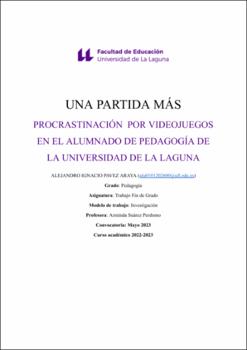Una partida más: Procrastinación por videojuegos en el alumnado de Pedagogía de la Universidad de La Laguna
Date
2023Abstract
La finalidad de este estudio es analizar la relación entre la procrastinación y el uso de
los videojuegos en el alumnado del grado de pedagogía de la Universidad de La Laguna. En
esta investigación se plantean 3 objetivos; por un lado, el objetivo general mencionado
anteriormente; Por otro lado los objetivos específicos, analizar la posible relación entre el
género y la conciencia del tiempo en el que están jugando y identificar la relación entre la
edad, el curso actual, cuánto tiempo dedican a los videojuegos, cuanto posponen sus tareas,
trabajos y horas de estudio y si esto les supone un problema. En la investigación participan 59
estudiantes, se recopiló la información a través de un cuestionario Google Forms de 12
preguntas. Se seleccionó a las y los participantes en base a su condición de estudiantes de
pedagogía de la Universidad de La Laguna. Tras analizar la muestra de 59 participantes en el
estudio, se pudo constatar que sólo 26 de ellas y ellos utilizan los videojuegos como forma de
procrastinación. En cuanto a los resultados, además de demostrar lo anterior, muestra que
hay una correlación entre las variables del segundo objetivo específico. Por esta razón, se
vislumbra la necesidad y la importancia de que el alumnado aprenda a equilibrar su tiempo
entre el uso de videojuegos y otras actividades importantes, como el estudio y la realización
de trabajos académicos. Esta investigación apoya a que se abran nuevas líneas de estudio para
ampliar el conocimiento sobre la influencia que tienen los videojuegos sobre el alumnado de
otros grados universitarios para comprobar si existe algún tipo de correlación entre el grado y
el uso de videojuegos para la procrastinación. The aim of this study is to analyse the relationship between procrastination and the
use of video games in students of the Bachelor's Degree in Pedagogy at the University of La
Laguna. On the one hand, the general objective mentioned above; on the other hand, the
specific objectives, to analyse the possible relationship between gender and awareness of the
time they are playing and to identify the relationship between age, the current course, how
much time they spend playing video games, how much they postpone their homework, work,
and study hours and whether this is a problem for them. The research involved 59 students,
and information was collected through a 12-question Google Forms questionnaire.
Participants were selected based on their status as student teachers at the University of La
Laguna. After analysing the sample of 59 participants in the study, it was found that only 26
of them use video games as a form of procrastination. As for the results, in addition to demonstrating the above, it shows that there is a correlation between the variables of the
second specific objective. For this reason, the need for and importance of students learning to
balance their time between the use of video games and other important activities, such as
studying and doing academic work, can be seen. This research supports the opening of new
lines of study to expand knowledge about the influence that video games have on students of
other university degrees to see if there is any correlation between the degree and the use of
video games for procrastination.




